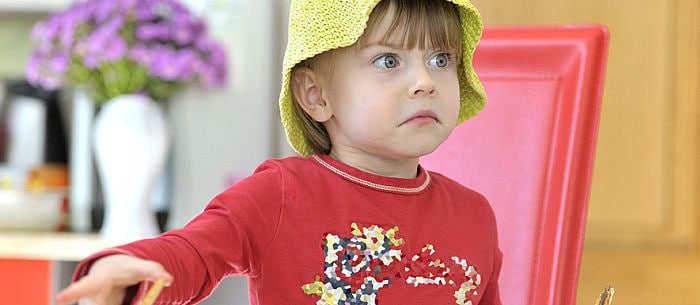The teacher pulls you aside again. Your little guy had to go into another time out. He hit another child. It’s not the first time he’s done this, but you are hoping it will be the last. You’ve tried to stop your toddler hitting, but your methods of discipline aren’t working. What do you do?
Here are 9 tips to stop toddler hitting:
Be There To Handle It
“Between the ages of 2 and 3, toddler social emotional development is such that children may become easily upset or impatient and show anger by striking out, so you need to be there to correct this behavior when it happens,” says Dr. Susan Perkins-Parks, a child psychologist.
Let’s say Sophie wants to go down the slide. She’s next in line when Aiden cuts in, so she hits him. What should you do? Be there to intervene. Tell Sophie to use her words.
Understand the Behavior
It’s important to realise that toddlers need to act out. “Toddlers do a lot of learning from pushing, biting, even hitting,” says Betsy Brown Braun, a child development and behavior specialist and author of “Just Tell Me What to Say.”
While it doesn’t make hitting right, she says, “When little Aaron suddenly hits his mum for putting him in time out, it doesn’t mean he’s bad, he’s just acting out — being a toddler.” Correct the behavior by focusing on the positive, saying something like, “Gentle hands!”
React Immediately
There needs to be an immediate reaction every time hitting happens, says Braun. “When you see that little hand about to go up — try to stop it before it comes down,” she stresses. Georgie has been hitting kids at the local water park. She wants to control the water blaster all by herself, but kids keep getting in her way.
What do you do? Wait and watch for Georgie’s little hand to go up and take a firm stand immediately! Leave if you must. She’ll soon learn that she can’t hit other kids if she wants to stay.
Note the Environment
To prevent hitting, toddlers need to be fed, rested and not pushed past their limits. Braun encourages parents to think about “lousy local conditions” — when toddlers’ environment sabotages them. It’s been a long trip through the supermarket.
This is the third errand you’ve dragged Henry to this afternoon. He can’t tell you he’s tired or hungry, so he hits. Next time, avoid “lousy conditions” by skipping some errands and being sure to pack a healthy snack for your child.
Watch What Your Toddler Watches
“Limit or eliminate exposure to violence and aggressive behavior,” says Dr. Perkins-Parks. “Certain games, toys and television programs should be monitored.” If parents laugh at people hitting each other on TV, toddlers are noting this.
Teach Sharing but Understand That Every Toy Is “Mine”
“At this age, toddlers think any toy they are playing with is theirs,” Braun says. Little Joey might hit Ava simply because Ava has the school bus Joey was playing with yesterday. To Joey, that bus is his! Teach Joey to share by praising him when he does, Braun says.
Praise Behavior Specifically
Dr Perkins-Parks encourages parents to promote positive behavior. “Attend positively by specifically praising the child for using behaviors other than aggression,” she advises. When your child uses her words and asks for what she wants — praise her passionately! Wait and watch for those moments that she is not reacting with hitting and give her plenty of love.
Teach Empathy
You also need to instruct your child what to do next — to help out the child he’s hit, Braun says. After the incident, say, “What you did hurt Jordan. He’s crying. What can we do to make him feel better?” Then help Jordan give back the toy to Jason and comfort him. Realise, though, that toddlers don’t know what “I’m sorry” means.
Talk to a Pro
“If you have tried multiple strategies for decreasing your toddler’s aggression without success, consult with your child’s primary care doctor and/or seek professional advice from a trained child mental health professional,” says Dr Perkins-Parks. Don’t be afraid to ask for help when you need it.
If you have childcare, ensure you share these strategies with your nanny or sitter to keep them clued in and your approaches to addressing toddler hitting consistent.
